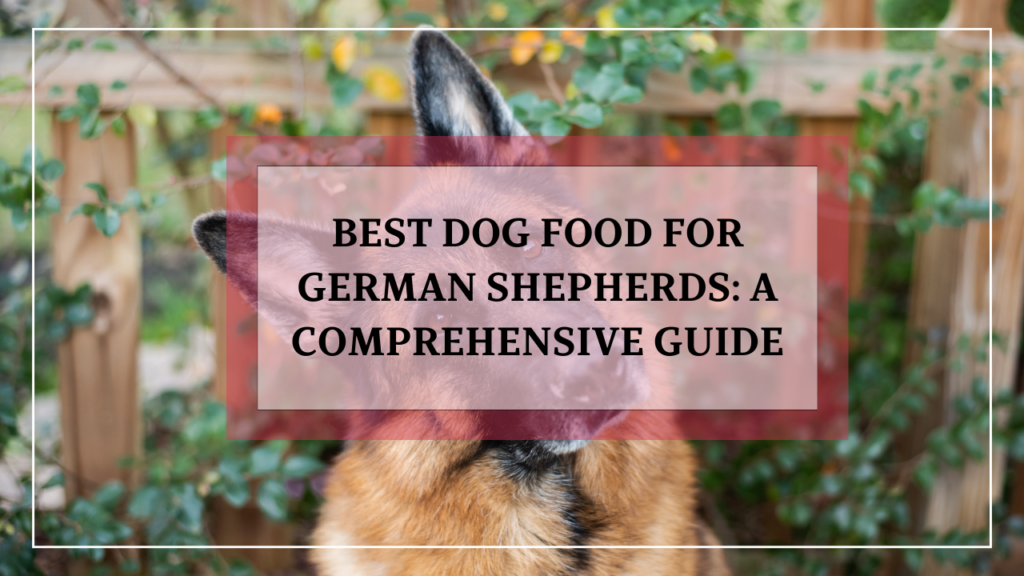Choosing the best dog food for German Shepherds is crucial for their overall health and well-being. German Shepherds are known for their intelligence, strength, and loyalty, but their unique nutritional needs require a carefully balanced diet to keep them in peak condition. Proper nutrition plays a significant role in their energy levels, coat health, and longevity. In this guide, we’ll explore why the right food is essential, the specific nutritional needs of German Shepherds, and the top choices for their diet.
Why Choosing the Right Dog Food Matters for German Shepherds
German Shepherds are active, large-breed dogs that have specific nutritional needs. Their diet directly impacts their physical health and energy levels. Here’s why choosing the right food is crucial:
- Health Maintenance: German Shepherds are prone to certain health issues, such as hip and elbow dysplasia and digestive problems. A balanced diet can help mitigate these risks by providing essential nutrients that support joint health, digestion, and overall vitality.
- Energy Levels: German Shepherds are known for their high energy levels and stamina. To maintain their activity levels, they require a diet rich in protein and fat, which provides the energy needed for daily activities.
- Coat and Skin Health: A diet rich in omega fatty acids is beneficial for maintaining a healthy, shiny coat and preventing skin issues. Proper nutrition can also help reduce shedding and prevent skin irritations.
- Longevity: Feeding your German Shepherd high-quality food can contribute to a longer, healthier life by supporting their immune system and reducing the risk of chronic diseases.
Understanding these factors helps in making informed choices about your dog’s diet, ensuring they get the best possible care.
Key Nutritional Needs for German Shepherds
German Shepherds have specific nutritional requirements that differ from other breeds due to their size, energy level, and predisposition to certain health issues. Understanding these needs is crucial for selecting the best dog food for your German Shepherd.
Protein Requirements
Importance of Protein: Protein is essential for German Shepherds because it supports muscle development, repair, and overall bodily functions. High-quality protein sources are vital for their growth, especially during their puppy and adolescent stages.
Recommended Protein Content: For adult German Shepherds, a diet containing 20-30% protein is generally recommended. Puppies and active working dogs may require higher levels of protein to support their growth and energy needs.
Best Protein Sources:
- Chicken: A highly digestible and lean source of protein.
- Beef: Rich in essential amino acids, though it can be higher in fat.
- Fish: Provides omega-3 fatty acids along with protein.
- Lamb: Good for dogs with food sensitivities.
Fat Content
Role of Fats: Fats are a crucial energy source for German Shepherds. They also support healthy skin and a shiny coat. Essential fatty acids like omega-3 and omega-6 are important for reducing inflammation and promoting overall health.
Ideal Fat Levels: A balanced diet for German Shepherds should contain about 8-20% fat. Higher fat content may be beneficial for highly active dogs or working dogs.
Best Fat Sources:
- Fish Oil: Rich in omega-3 fatty acids, supports coat health and reduces inflammation.
- Flaxseed Oil: A plant-based source of omega-3s.
- Chicken Fat: Provides essential fatty acids and energy.
Carbohydrates and Fiber
Benefits of Carbohydrates and Fiber: Carbohydrates provide energy and aid in digestion. Fiber helps maintain healthy digestion and prevents constipation. It’s essential for German Shepherds, especially those prone to digestive issues.
Recommended Sources:
- Sweet Potatoes: High in fiber and vitamins.
- Brown Rice: Easily digestible and provides sustained energy.
- Peas: Good source of protein and fiber.
- Oats: Helps with digestion and provides a steady energy supply.
Vitamins and Minerals
Essential Vitamins and Minerals: German Shepherds require a range of vitamins and minerals to support their immune system, bone health, and overall vitality.
Key Vitamins:
- Vitamin A: Supports vision and skin health.
- Vitamin D: Aids in calcium absorption for strong bones.
- Vitamin E: Acts as an antioxidant and supports cell health.
Important Minerals:
- Calcium: Essential for strong bones and teeth.
- Phosphorus: Works with calcium to maintain bone health.
- Zinc: Supports skin health and immune function.
How to Ensure Balanced Intake: When selecting dog food, look for brands that list these nutrients on the label. High-quality foods often have a balance of these essential vitamins and minerals, ensuring your German Shepherd’s dietary needs are met.
Types of Dog Food Suitable for German Shepherds
When choosing the best dog food for German Shepherds, you have several options, each with its own benefits and considerations. Here’s a comprehensive look at the different types of dog food available:
Dry Kibble
Advantages:
- Convenience: Easy to store and serve.
- Dental Health: Helps reduce plaque and tartar buildup due to its texture.
- Cost-Effective: Generally more affordable than other types of dog food.
Disadvantages:
- Lower Moisture Content: Can be less palatable and hydrating compared to wet food.
- Quality Variation: Some brands use fillers and lower-quality ingredients.
Top Brands and Products:
- Royal Canin German Shepherd Adult: Specially formulated to meet the needs of German Shepherds, including joint support and skin health.
- Hill’s Science Diet Adult Large Breed: Provides balanced nutrition with high-quality protein and essential nutrients.
- Orijen Original Dry Dog Food: Grain-free with a high protein content, suitable for active German Shepherds.
Wet Food
Benefits:
- Higher Moisture Content: Helps with hydration and can be more palatable for picky eaters.
- Easier to Digest: Often more suitable for dogs with dental issues or sensitive stomachs.
Considerations:
- Price: Generally more expensive than dry kibble.
- Storage: Requires refrigeration after opening.
Recommended Wet Food Brands:
- Merrick Grain-Free Texas Beef: High in protein and free from grains, suitable for German Shepherds with food sensitivities.
- Purina Pro Plan Savor Adult: Contains high-quality protein and supports overall health.
- Wellness CORE Grain-Free: Provides balanced nutrition with a focus on high protein and low carbs.
Raw Food (BARF Diet)
What is the BARF Diet? The BARF (Bones and Raw Food) diet consists of raw meat, bones, fruits, and vegetables. It aims to mimic a natural diet based on what dogs’ ancestors would have eaten.
Pros:
- Natural Nutrition: Offers a diet closer to what dogs evolved to eat.
- Improved Coat and Energy Levels: Some owners report healthier coats and increased energy.
Cons:
- Preparation Time: Requires careful preparation and knowledge to ensure a balanced diet.
- Risk of Contamination: Potential for bacterial contamination if not handled properly.
Tips for Transitioning to Raw Food:
- Consult a Veterinarian: Ensure the diet meets all nutritional needs.
- Gradual Introduction: Slowly mix raw food with current food to prevent digestive upset.
- Monitor Health: Keep track of any changes in your dog’s health and adjust the diet accordingly.
Homemade Dog Food
Benefits:
- Control Over Ingredients: You can choose high-quality, fresh ingredients.
- Customization: Tailor the diet to your dog’s specific needs or allergies.
Considerations:
- Nutritional Balance: Ensuring the diet is complete and balanced can be challenging without expert guidance.
- Preparation: Time-consuming and requires careful planning.
Recommended Homemade Recipes:
- Chicken and Vegetable Stew: Includes lean chicken, carrots, peas, and sweet potatoes.
- Beef and Brown Rice: Cooked ground beef with brown rice and a mix of vegetables.
Top Brands of Dog Food for German Shepherds
When selecting the best dog food for German Shepherds, choosing high-quality brands that meet their specific nutritional needs is essential. Here’s a comprehensive look at some of the top brands and what they offer:
Premium Brands
Premium dog food brands often provide superior ingredients and formulations tailored to the needs of German Shepherds. Here are a few top recommendations:
- Royal Canin German Shepherd Adult
Overview: Royal Canin offers a formula specifically designed for German Shepherds. It includes tailored nutrients to support joint health, digestion, and coat condition.
Key Features:- Tailored Kibble Size: Designed for the German Shepherd’s unique jaw structure.
- Joint Support: Includes glucosamine and chondroitin.
- Digestive Health: Special fiber blend to support digestion.
- Hill’s Science Diet Adult Large Breed
Overview: Hill’s Science Diet is known for its balanced nutrition and high-quality ingredients. This formula is ideal for large breeds like German Shepherds.
Key Features:- High-Quality Protein: Chicken as the primary ingredient.
- Bone Health: Balanced calcium and phosphorus.
- Antioxidants: Supports immune system health.
- Orijen Original Dry Dog Food
Overview: Orijen offers a biologically appropriate diet with high protein content from fresh, regional ingredients.
Key Features:- High Protein: Includes free-run chicken and turkey, wild-caught fish.
- Grain-Free: Suitable for dogs with grain sensitivities.
- Whole Prey Ingredients: Mimics a natural diet.
Budget-Friendly Options
If you’re looking for quality dog food without breaking the bank, there are several budget-friendly options that still offer good nutrition:
- Purina Pro Plan Savor Adult
Overview: Purina Pro Plan offers a cost-effective option that doesn’t compromise on quality. It includes high-quality protein and essential nutrients.
Key Features:- Real Chicken: The first ingredient.
- Probiotics: Supports digestive health.
- Omega Fatty Acids: For a healthy coat and skin.
- Blue Buffalo Life Protection Formula
Overview: Blue Buffalo provides a reasonably priced option with high-quality ingredients and no artificial preservatives.
Key Features:- Deboned Chicken: Primary source of protein.
- LifeSource Bits: Antioxidant-rich blend.
- No Corn, Wheat, or Soy: Good for sensitive stomachs.
- Iams ProActive Health Large Breed
Overview: Iams offers a well-balanced formula designed specifically for large breeds like German Shepherds, focusing on health and vitality.
Key Features:- Chicken and Turkey: High-quality protein sources.
- Glucosamine and Chondroitin: For joint health.
- Tailored Fiber Blend: Supports digestive health.
Choosing the Right Brand
When selecting a brand for your German Shepherd, consider the following factors:
- Ingredient Quality: Look for high-quality proteins and fats, and avoid fillers and artificial additives.
- Nutritional Balance: Ensure the food provides balanced nutrition for your dog’s age, size, and activity level.
- Price vs. Value: Consider both the cost and the nutritional benefits offered by the food.
Common Mistakes to Avoid When Choosing Dog Food for German Shepherds
Selecting the best dog food for German Shepherds can be challenging, and several common mistakes can affect your dog’s health and well-being. Here’s a guide to avoiding these pitfalls:
1. Overlooking Ingredient Quality
Mistake: Many dog foods contain fillers, artificial additives, and by-products that do not provide the necessary nutrients for your German Shepherd.
How to Avoid:
- Read Labels Carefully: Look for whole, named proteins (like chicken or beef) as the first ingredient.
- Avoid Fillers: Ingredients such as corn, wheat, and soy offer little nutritional value.
- Check for Additives: Steer clear of artificial colors, flavors, and preservatives.
2. Ignoring Special Dietary Needs
Mistake: Each German Shepherd has unique dietary needs based on age, health condition, and activity level. Ignoring these needs can lead to health problems.
How to Avoid:
- Consult Your Veterinarian: Discuss your dog’s specific needs, especially if they have health issues like allergies or digestive problems.
- Choose Age-Appropriate Formulas: Puppies, adults, and seniors have different nutritional requirements.
- Consider Special Diets: For example, if your dog has joint issues, look for food with added glucosamine and chondroitin.
3. Not Transitioning Foods Gradually
Mistake: Suddenly changing your German Shepherd’s food can lead to digestive upset, including vomiting and diarrhea.
How to Avoid:
- Gradual Transition: Mix the new food with the old food over 7-10 days, gradually increasing the proportion of the new food.
- Monitor Digestive Health: Watch for any signs of digestive distress during the transition period.
4. Relying Solely on Brand Reputation
Mistake: While a reputable brand is important, it’s not the only factor in choosing the right food. High price or brand name does not always guarantee high quality.
How to Avoid:
- Research Ingredients: Focus on the actual ingredients and nutritional content rather than just the brand name.
- Read Reviews and Ratings: Look at reviews from other pet owners and consider the experiences of others with similar needs.
5. Failing to Consider Your Dog’s Weight and Activity Level
Mistake: Feeding your German Shepherd too much or too little based on their activity level can lead to obesity or undernutrition.
How to Avoid:
- Follow Feeding Guidelines: Use the feeding recommendations on the dog food package as a starting point, and adjust based on your dog’s weight and activity level.
- Monitor Weight and Condition: Regularly check your dog’s weight and body condition. Adjust food portions if necessary.
6. Neglecting to Include Variety
Mistake: Feeding the same food every day can lead to nutrient imbalances and lack of interest in food.
How to Avoid:
- Introduce Variety: Occasionally rotate between different high-quality foods or add healthy toppings and supplements.
- Balance with Treats: Ensure treats and snacks are nutritious and do not make up more than 10% of your dog’s daily caloric intake.
7. Overlooking the Importance of Hydration
Mistake: Dry kibble alone may not provide adequate hydration for your German Shepherd, especially if they are not drinking enough water.
How to Avoid:
- Provide Fresh Water: Always have clean, fresh water available for your dog.
- Consider Wet Food: Mixing wet food with dry kibble can help increase your dog’s water intake.
How to Transition Your German Shepherd to New Food
Transitioning your German Shepherd to new food should be done gradually to ensure a smooth adjustment and prevent digestive upset. Here’s a step-by-step guide to help you make the change successfully:
1. Plan the Transition
Why Transition Gradually?
- Digestive Sensitivity: A sudden change in diet can disrupt your dog’s digestive system, leading to issues like diarrhea or vomiting.
- Adjustment Period: Gradual changes allow your German Shepherd’s digestive enzymes and gut flora to adjust to the new food.
Steps to Plan:
- Choose the Right Time: Start the transition during a period when your dog is healthy and not under stress.
- Select a New Food: Ensure the new food is of high quality and appropriate for your German Shepherd’s age, size, and health needs.
2. Start with a Mix
Creating the Blend:
- Initial Ratio: Begin by mixing a small amount of the new food with your dog’s current food. A common starting ratio is 25% new food to 75% old food.
- Mix Thoroughly: Ensure the new food is evenly mixed with the old food to help your dog adjust to the new flavor and texture.
Monitoring Initial Reactions:
- Observe for Reactions: Watch for any signs of digestive upset or allergies, such as changes in stool consistency, vomiting, or itching.
- Adjust as Needed: If any issues arise, consult your veterinarian and adjust the transition plan if necessary.
3. Gradually Increase the New Food
Step-by-Step Increase:
- Week 1: Continue with the 25% new food and 75% old food mixture. Monitor your dog’s response.
- Week 2: Increase the ratio to 50% new food and 50% old food.
- Week 3: Move to 75% new food and 25% old food.
- Week 4: Transition to 100% new food, provided your dog has tolerated the changes well.
Tips for Smooth Transition:
- Consistency is Key: Stick to the gradual transition schedule to give your dog’s digestive system time to adjust.
- Monitor Health: Keep an eye on your dog’s weight, coat condition, and overall health throughout the transition.
4. Adjust Based on Your Dog’s Needs
Recognize Individual Needs:
- Age and Size: Puppies, adults, and senior German Shepherds may require different transition timelines based on their digestive resilience and nutritional needs.
- Health Conditions: Dogs with health issues like allergies or gastrointestinal problems might need a more tailored transition approach.
5. Provide a Positive Experience
Encourage Acceptance:
- Use Positive Reinforcement: Reward your dog with praise and treats when they eat the new food to create a positive association.
- Avoid Stressful Situations: Keep the transition period calm and avoid other major changes in your dog’s routine or environment.
6. Consult Your Veterinarian
Seek Professional Advice:
- Health Monitoring: If your dog experiences persistent issues or if you’re unsure about the new food, consult your veterinarian.
- Nutritional Guidance: Your vet can provide additional advice and ensure the new food meets all of your German Shepherd’s nutritional needs.
FAQs: Best Dog Food for German Shepherds
1. What should I look for in the best dog food for German Shepherds?
When selecting the best dog food for German Shepherds, focus on:
- High-Quality Protein: Look for named animal proteins (e.g., chicken, beef) as the primary ingredient.
- Balanced Nutrition: Ensure the food contains a balanced ratio of protein, fats, and carbohydrates.
- Joint Health Support: Ingredients like glucosamine and chondroitin are beneficial for joint health.
- Digestive Health: Fiber sources and probiotics can aid in digestion.
- No Fillers or Artificial Additives: Avoid foods with excessive fillers like corn, wheat, soy, and artificial preservatives.
2. How can I tell if a dog food brand is high quality?
High-quality dog food brands typically:
- List High-Quality Ingredients: Check for named proteins and whole foods rather than by-products and fillers.
- Provide Transparency: Look for brands that disclose their ingredient sourcing and manufacturing processes.
- Have Positive Reviews: Research customer feedback and third-party reviews.
- Meet AAFCO Standards: Ensure the food meets the standards set by the Association of American Feed Control Officials (AAFCO) for complete and balanced nutrition.
3. Can I feed my German Shepherd homemade dog food?
Yes, homemade dog food can be a nutritious option if prepared correctly. To ensure a balanced diet:
- Consult a Veterinarian or Pet Nutritionist: Get guidance on formulating a complete and balanced diet.
- Use High-Quality Ingredients: Include a variety of proteins, vegetables, and healthy fats.
- Avoid Toxic Foods: Some human foods are toxic to dogs, such as onions, garlic, and chocolate.
4. How long does it take for a German Shepherd to adjust to new food?
Typically, it takes about 7-10 days for a German Shepherd to adjust to new food. Transition gradually by mixing the new food with the old food, starting with a small amount and increasing over time. Monitor your dog’s health and adjust if necessary.
5. What are common signs that the new dog food is not suitable for my German Shepherd?
Signs that the new dog food may not be suitable include:
- Digestive Issues: Vomiting, diarrhea, or changes in stool consistency.
- Allergic Reactions: Itching, excessive scratching, or skin rashes.
- Lack of Appetite: Refusal to eat or a sudden decrease in appetite.
- Behavioral Changes: Increased lethargy or irritability.
6. Can I mix dry kibble with wet food for my German Shepherd?
Yes, mixing dry kibble with wet food can provide a balance of hydration and texture. Ensure that the combined food meets your German Shepherd’s nutritional needs and adjust portions accordingly. Monitor your dog for any digestive changes.
7. Is it necessary to choose a food specifically labelled for large breeds?
For German Shepherds, which are a large breed, choosing food labelled for large breeds is beneficial as it is formulated to support their specific needs, including joint health and proper nutrient balance. Large breed formulas often include adjusted levels of calcium and phosphorus to support bone health.
8. How often should I change my German Shepherd’s food?
Frequent changes are generally unnecessary unless there are specific health reasons or dietary adjustments needed. Consistently feeding a high-quality food that meets your German Shepherd’s nutritional needs is usually the best approach. Consult your veterinarian before making any changes.
9. Can I use dog food as treats for training?
Yes, you can use your dog’s regular food or specially formulated treats for training. Ensure that the treats are nutritious and do not exceed 10% of your dog’s daily caloric intake to maintain a balanced diet.
10. What should I do if my German Shepherd refuses to eat the new food?
If your German Shepherd refuses to eat the new food:
- Check for Freshness: Ensure the food is fresh and not expired.
- Mix with Favorite Foods: Add a small amount of the new food to their favourite foods or treats to encourage acceptance.
- Consult a Veterinarian: If the refusal persists or is accompanied by other symptoms, consult your vet to rule out underlying health issues.

Hi, I’m Ali Tarek, the founder of Animalsman. I’ve always been passionate about pets, especially dogs and cats, and I created this website to share practical tips, easy recipes, and helpful care advice for fellow pet lovers. My goal is to make pet care simple, enjoyable, and accessible for everyone. When I’m not writing or curating content, you’ll usually find me spending time with my furry friends or learning new ways to keep them happy and healthy.



